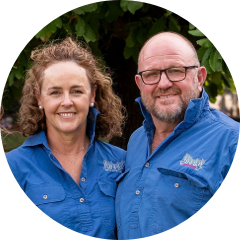Small farm dam suitability assessment
Term
2023-2024
Project Officer
Jane McInnes
WHY THIS PROJECT IS NEEDED
Many broadacre farming businesses rely on capturing and storing surface water (rainfall run-off) using multiple small paddock dams for stock and domestic use.
These dams have limited capacity to store water for multiple years, and rely on regular surface runoff to be replenished.
In a ‘normal’ year, reduced runoff may be sufficient to meet requirements, but in drought conditions they are often inadequate.
This lack of water during drought restricts the ability to graze any remaining feed such as crop stubble, failed crops or dry standing feed, often leading to the forced sale of livestock. It also restricts the availability of water for domestic use.
Knowing the suitability of existing farm dams therefore helps plan for better drought resilience.
In short: The project aims to develop a calculator that estimates rainfall run-off into farm dams, to help farmers improve their drought management.
Project focus
The project aims to develop new and improved tools, technologies and practices to support improved management and drought resilience.
The project involves the development of a spatial tool to rapidly calculate the likely runoff into existing farm dams. This type of calculator does not exist (current approaches are designed for flood rather than drought planning) and will help farmers prepare, cope and recover from drought.
This online tool will enable farmers to self-assess the adequacy of their current farm dams in capturing sufficient water for farm operations.
Project outcomes
Twelve regionally spread small farm dams will be monitored over two seasons (2023–24) to collect surface runoff (calibration) data.
This will help create an on-line farm dam calculator, so that farmers and landholders can assess the adequacy of an individual farm dam under different climatic scenarios.
Workshops will also be held to provide an opportunity for farmers to discuss the adequacy of their existing farm dams, how this impacts their farm drought resilience, and how the farm dam model can be used to assess the value of their farm dams.
Whole farm case studies will provide practical insights for farmers looking to improve their drought resilience.
Find out more
For further information, please contact Riverine Plains Senior Project Manager, Jane McInnes at jane@riverineplains.org.au
Project investment
This project is funded by the Australian Government’s Future Drought Fund through the Drought Resilience Innovation Grants Program.
Partners
This project is led by Southern Farming Systems.
Project partners include Birchip Cropping Group, Food and Fibre Gippsland, Nicon Rural Services, The University of Melbourne, Deakin University, La Trobe University, Federation University Australia, and Agriculture Victoria.
MORE ON Drought & Livestock
Our research enhances food production, increases environmental resilience and improves community connection across the Riverine Plains. See how our research creates impact.
-
Drought
Livestock
-
Sustainability
Drought
-
Livestock
Fodder
-
Drought
Grains
-
Drought
-
Drought
-
Livestock
Drought
-
Drought
Livestock
-
Drought
Livestock
-
Drought
People
-
Livestock
Grains
JOIN RIVERINE PLAINS
Riverine Plains provides opportunities to see new research and innovation, connect with rural communities, and attend informative events.


